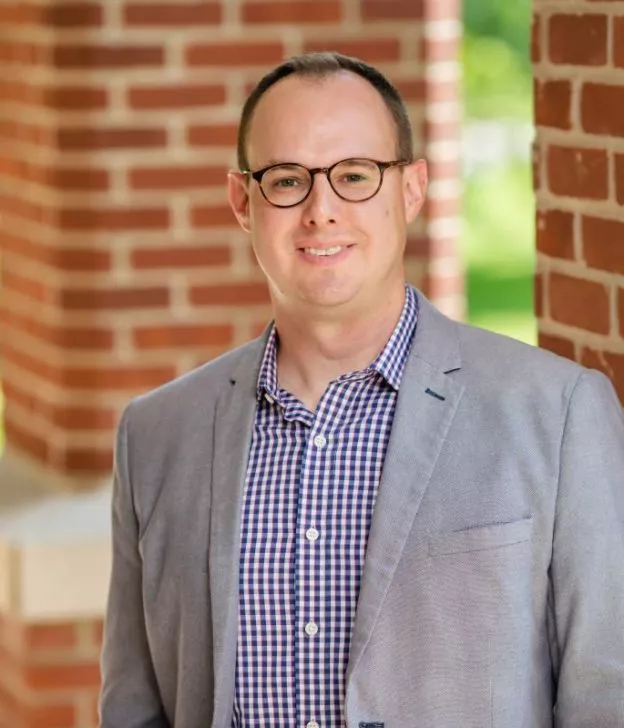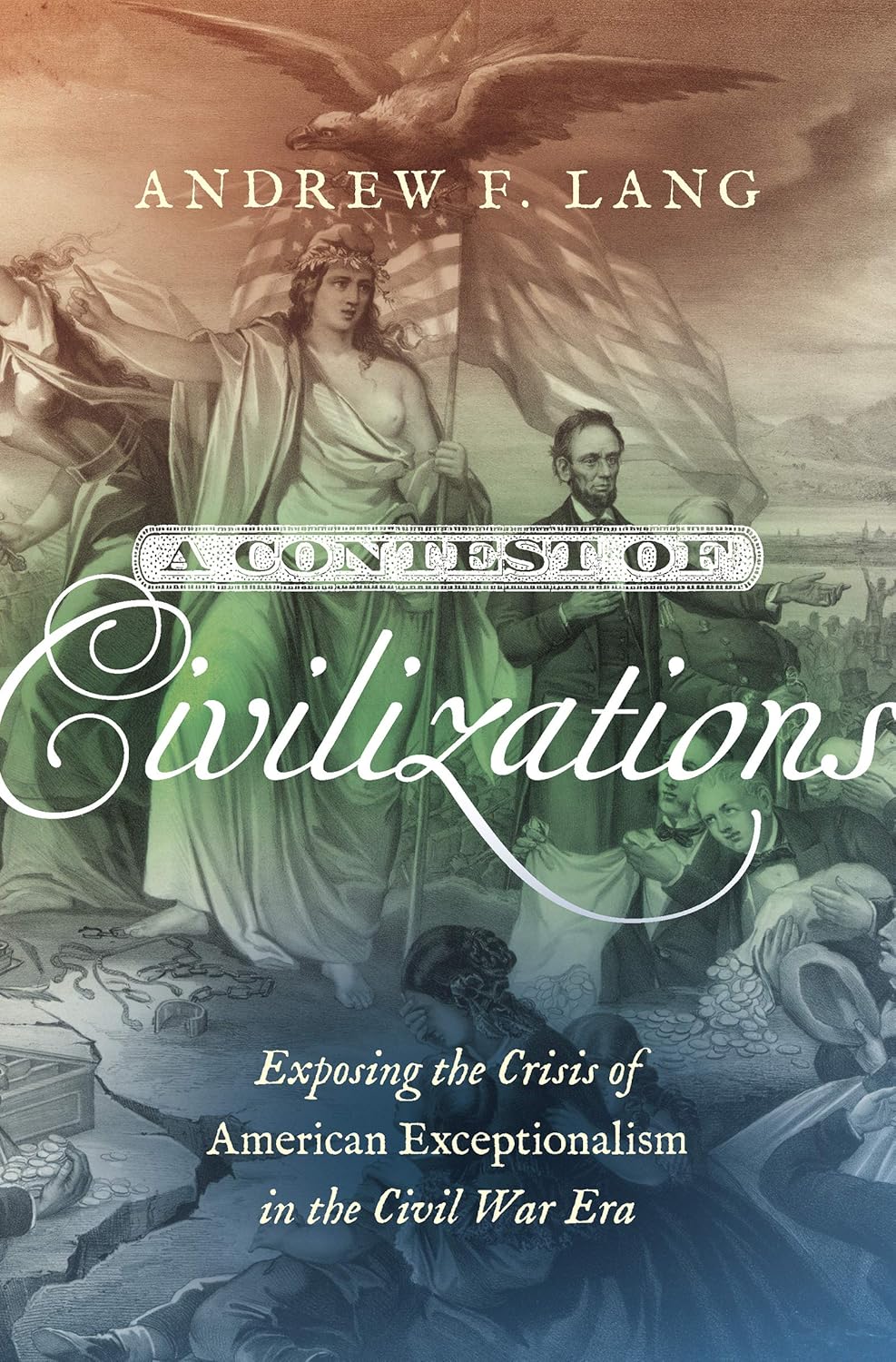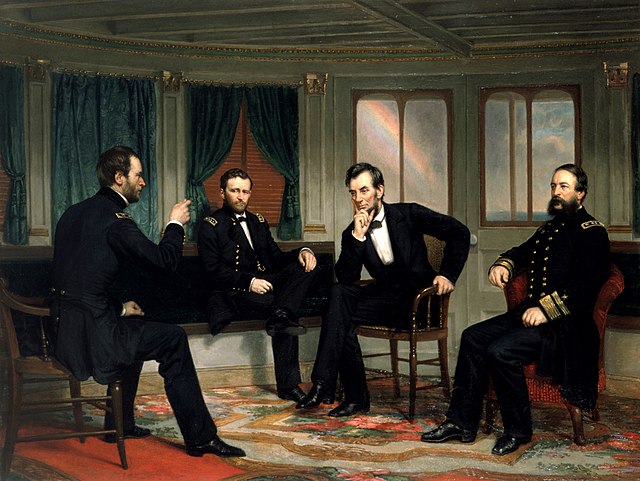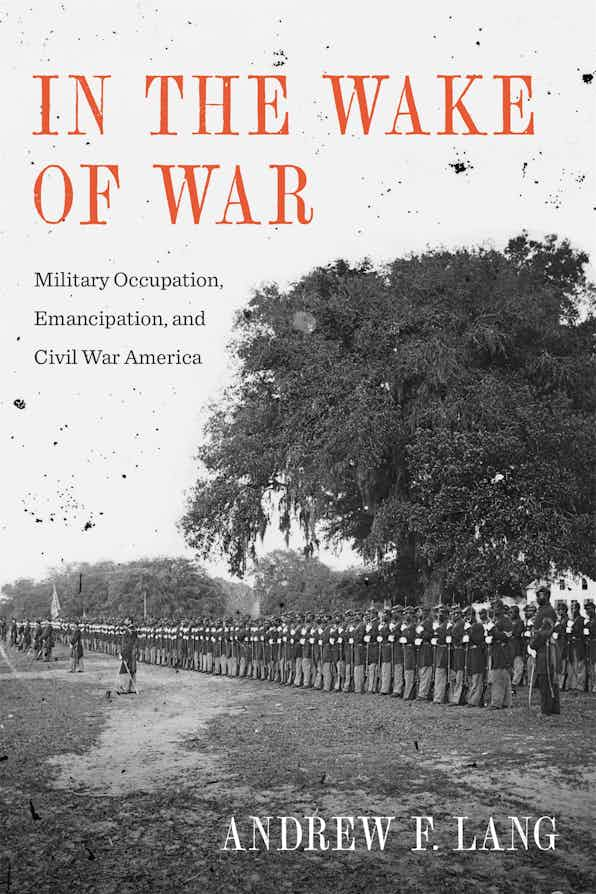
An interview with Andrew Lang
JMC Resident Historian Elliott Drago sat down with JMC Miller Fellow Andrew Lang. Dr. Lang teaches at Mississippi State University.
ED: What inspired you to become a historian?
AL: I enrolled in college in 2001, not having any idea what I wanted to do with my life. An average high school student, few then would have considered me pursuing the academic route, much less being a practitioner in the life of the mind. Yet during my first semester, I enrolled in the obligatory first-half survey of US history, offered by a professor whose lectures captivated my imagination. Unlike some students who scorn the burden of slogging through material from an allegedly irrelevant and long-ago past, I found myself immersed in the personalities and problems, the tragedies and triumphs of American history. Little then did I know, but over the subsequent year, I got to know this professor and took from him the second half of American history as well as several of his upper-division courses. I soon declared a major in history and a minor in political science, even as I prepared to attend law school.
But in 2003, a trip with my father to Washington, DC, altered my plans. Standing on the battlefield at Antietam, Maryland convinced me to dedicate my life to studying the American Civil War Era, a field to which I had been drawn since my interest in history began. The professor from whom I took that first history course ended up becoming not only my undergraduate and MA advisor, but also a life mentor and dear friend. For 20 years we maintained a close correspondence until his passing in 2022 on my 40th birthday. I owe my career both to him and my parents who always believed in my capacity to be an independent thinker.

ED: What is your area of specialty, and what sparked your interest in that topic?
AL: I am a historian of the U. S. Civil War Era, the pivotal event at the heart of the national experience. The Civil War was a referendum on the founding of 1776, a fundamental moment which compelled Americans then and ever since to reckon with the propositions of innate human equality and the capacity of free people to govern themselves. Long before college, I maintained a fleeting interest in the Civil War. I recall answering correctly a question posed in a second-grade trivia game: which two battles constituted the turning point of the Civil War? I replied, “Vicksburg and Gettysburg.” Only now in my professional life do I realize with great shame the inaccuracies of my assumption!
I also remember being transfixed while writing a brief biographical paper on Abraham Lincoln during the sixth or seventh grade. But it was not until my first year of college in 2001, and influenced soon after by reading David McCullough’s charming John Adams, that I realized I wanted to be a historian.
The stories of the founding, the building of a new republic, the hostile drama of the sectional crisis over slavery, and ultimately the Civil War itself occupied my unbending attention.
AL: An understanding of the American character and constitutional democracy requires a considered reckoning with the Civil War and its meaning. It was an event that hardly resides in history. “The struggle of today, is not altogether for today,” Lincoln predicted in 1861, “it is for a vast future also.” I consider it the privilege of a lifetime to be able to convey to twenty-first century audiences the enduring lessons and significance of the conflict.
ED: Describe your favorite research “rabbit hole,” and the results of that quest.
AL: There are so many to choose from! But it seems just to focus on the origins of my doctoral dissertation, which ultimately became my first book, In the Wake of War: Military Occupation, Emancipation, and Civil War America (2017). In 2010, while dabbling in potential research topics, daily reports consumed the news on the ongoing military challenges in Iraq. Though years prior President George W. Bush had proclaimed “Mission Accomplished,” the twin trials of nation-building and counterinsurgency continued to plague United States forces. When and how do wars end, I wondered? What did it mean to be a military occupier? To what extent did the problems of the twenty-first century reflect Union military operations during the Civil War and its long aftermath?
I quickly recognized that the Civil War, like its counterpart in Iraq (even though both conflicts were very different), revealed that modern military conflicts were hardly tidy.
AL: These were wars of occupation, wars in which soldiers engaged ununiformed combatants, unfolded revolutionary social and political policies, enacted state initiatives, and attempted to mold some kind of peace even in the face of intermittent, irregular violence. Though neither my dissertation nor book evaluated the past according to our experiences in the present, I nevertheless approached Civil War history with an eye towards the ways we today think about the military’s place in a democracy.
ED: Your most recent book, A Contest of Civilizations: Exposing the Crisis of American Exceptionalism in the Civil War Era, focuses on how antebellum Americans interpreted “exceptionalism.” How did Northerners and Southerners differ in their interpretation of that concept? Were there any points of commonality between those groups?

AL: Properly understood, American exceptionalism is the idea that as a natural rights republic, the United States was founded in diametric contrast to a world of divine right monarchies, indulgent aristocracies, privileged oligarchies, and oppressive military states. The federal system itself marked a noteworthy departure in global political organization. As the statesman Daniel Webster remarked in 1832, “Such a thing has happened once in human affairs, and but once; the event stands out as a prominent exception to all ordinary history.” I argue that to understand the American Civil War Era is to recognize how fiercely competing notions of exceptionalism caused the war, ordered its conduct, and unfolded the conflict’s long aftermath.
As with most issues in nineteenth-century America, Abraham Lincoln perhaps best helps us understand matters. In April 1864, while addressing the Baltimore Sanitary Fair, Lincoln reflected on the two irreconcilable positions at the heart of the sectional crisis and civil war:
“The world has never had a good definition of the word liberty, and the American people, just now, are much in want of one. We all declare for liberty; but in using the same word we do not all mean the same thing. With some the word liberty may mean for each man to do as he pleases with himself, and the product of his labor; while with others the same word may mean for some men to do as they please with other men, and the product of other men’s labor. Here are two, not only different, but incompatible things, called by the same name, liberty.
“And it follows that each of the things is, by the respective parties, called by two different and incompatible names–liberty and tyranny.”
AL: Lincoln accurately captured the era’s crisis of exceptionalism. Proslavery apologists heralded the United States as the world’s foremost slaveholding superpower. Likewise, architects of the Confederacy blessed their new “nation” as the first in world history to be established on the slaveholding principle. Those of Lincoln’s persuasion, however, regarded slavery as a blot on the United States’s unique dedication to the inalienable rights of all individuals, an exceptional nation dedicated to natural equality, the dignity of labor, the sacredness of sovereign independence.
ED: Writing in 1910, the professor of rhetoric Wilmot Brookings Mitchell stated that Lincoln was “master of himself.” What did “mastery” mean to Lincoln, and what lessons can we learn from his self-mastery?
AL: In August 1858, as he prepared for his storied debates against his political rival Stephen A. Douglas, Lincoln scribbled a brief note to himself. He often did this as he solved problems and worked out his political positions, later infusing these ideas into his public remarks. Lincoln’s note said: “As I would not be a slave, so I would not be a master. This expresses my idea of democracy. Whatever differs from this, to the extent of the difference, is no democracy.” Here, in fewer than 40 words, is the full range of Lincoln’s political thought.
For Lincoln, contra Douglas, democracy was not the game of pure majoritarian rule in which the might of 51 percent can dominate the 49 percent. Such was the same kind of despotism as monarchy. The reason was simple: whether in slavery, in majoritarian mob rule, or in monarchy, the individual had no consent, no voice, no political rights. “Mastery” thus violates the fundamental essence of what it means to be a human. Lincoln later clarified the matter when he said,
“he who would be no slave, must consent to have no slave. Those who deny freedom to others, deserve it not for themselves.”
AL: All individuals, rather, possess mastery over themselves. And in a natural rights political regime ordered by constitutional restraints, the rule of law, and civil liberties, all people possess the unalienable right to rise, to claim the fruit of their labor, to secure independence, to guard their innate self-worth.
In December 1861, he informed Congress that these natural rights underscored the stakes of the Civil War: “This is the just and generous and prosperous system which opens the way to all, gives hope to all, and consequent energy and progress and improvement of condition to all.” To abandon this principle was to abandon the logic of the Declaration of Independence, consigning free people to the perpetual threat of arbitrary oppression.
ED: In 1861, Lincoln explained how the Declaration of Independence was an “apple of gold” framed by the “silver picture” of the Union and the Constitution. Tell us a bit about the political context in which Lincoln developed this metaphor.

AL: Here, too, is another of Lincoln’s wonderful little fragments that he penned to himself in January 1861, a mere two months before his first presidential inauguration. Shortly after his election to the presidency in November 1860, Lincoln received a letter from an old acquaintance from the Whig Party: Georgia Senator Alexander H. Stephens, who later became Vice President of the Confederacy. But Stephens at first opposed southern secession, and he beseeched Lincoln to pledge to slaveholders that his administration would protect slavery. Indeed, “A word ‘fitly spoken’ by you now would be like ‘apples of gold in pictures of silver,’” Stephens informed the president-elect. Stephens quoted from Proverbs 25:11 in which Solomon reflects on the kinds of sentiments that most pleased God, words that conveyed virtue, truth, and reverence. Stephens essentially asked Lincoln to genuflect to slaveholders and the power of a slaveholding Union. Stephens considered slavery the essential cornerstone of the American nation, the centerpiece of the founders’ experiment.
Lincoln did not reply to Stephens, instead sketching to himself the implications of “apples of gold” and “pictures of silver.” When he drafted this fragment in January 1861, we can see in real-time not only how Lincoln thought about the American founding. We can also see what he considered to be the stakes in the fomenting secession crisis: the legacy of the founding and the intrinsic purposes of the Declaration of Independence, which he heralded as the “apple of gold,” and the Constitution, which he identified as the “picture of silver.” The latter—the Union, the rule of law, democratic self-government—operated according to a moral principle to uphold, protect, and showcase the former’s self-evident truth of natural human equality.
“The assertion of that principle, at that time, was the word ‘fitly spoken’ which has proved an ‘apple of gold’ to us,” Lincoln wrote to himself.
“The Union and the Constitution are the picture of silver, subsequently framed around it. The picture was made not to conceal or destroy the apple but to adorn, and preserve it. The picture was made for the apple—not the apple for the picture.”
ED: Many Americans today (and in Lincoln’s time) believe in the inevitability of societal “progress.” What were Lincoln’s views of progress, and how did his views on progress influence his immortal words that the United States was “the last best hope of earth”?
AL: Lincoln believed deeply in progress. He, like so many of his contemporaries, viewed the United States as the vanguard of modernity and invention. But he also issued several critical caveats. Lincoln’s era witnessed various factions in the Democratic Party and in anti-immigrant nativist movements that hailed the nation as founded only for white men, that the destiny of white supremacy justified continental domination and expansion. This, of course, was the same logic that justified racial chattel slavery. These powerful currents troubled Lincoln.
In 1855, fearful of the swift nationalization—rather than restriction—of slavery, Lincoln revealed his fear and disgust for ethnic and racial politics.
“Our progress in degeneracy appears to me to be pretty rapid,” he told his close friend Joshua Speed. “As a nation, we began by declaring that ‘all men are created equal.’ We now practically read it ‘all men are created equal, except negroes.’ When the Know-Nothings get control, it will read ‘all men are created equal, except negroes, and foreigners, and Catholics.’ When it comes to this I should prefer emigrating to some country where they make no pretence of loving liberty — to Russia, for instance, where despotism can be taken pure, and without the base alloy of hypocracy.”
Lincoln believed that progress unfolded only when tethered to the objective moral principle of natural rights. If a free society constantly redefined human nature, human rights, and even the history of the American founding itself, then it authored its own decline and oppression. Lincoln likewise warned that progress and prosperity breed complacency, historical amnesia, and civic ambivalence. Such traits are devastating to the vitality of a constitutional republic.
In 1860, in his speech at the Cooper Institute, Lincoln offered yet another caveat: “Now, and here, let me guard a little against being misunderstood. I do not mean to say we are bound to follow implicitly in whatever our fathers did. To do so would be to discard all the lights of current experience—to reject all progress—all improvement. What I do say is, that if we would supplant the opinions and policy of our fathers in any case, we should do so upon evidence so conclusive, and argument so clear, that even their great authority, fairly considered and weighed, cannot stand; and most surely not in a case whereof we ourselves declare they understood the question better than we.” In other words, Americans would do well to measure their generational progress according to the maxims in the Declaration of Independence and the restraints in the Constitution.
ED: To what extent did Abraham Lincoln believe that all Americans were responsible for the institution of slavery?
AL: Lincoln indeed believed that slavery was a national problem which required a national solution. He also considered slavery a monarchical relic from the colonial era, an institution that he believed the founders tolerated, but also placed on the ultimate road to extinction. He arrived at this conclusion from his reading of the Declaration and Constitution, in which he found evidence of the founders’ intents to restrict the spread of slavery, to cut off its source from the international slave trade, and to surround the institution with free territories and states. During the nineteenth century, as the institution proliferated with peculiar power and enjoyed strident sanction from the federal government, Lincoln considered it the responsibility of all to recommit to the nation’s founding principles and reaffirm the objective creed of universal human equality. Without a consensus on that maxim, slavery would never be contested.
“If the negro is a man, why then my ancient faith teaches me that ‘;all men are created equal,’” Lincoln said in 1854, “and that there can be no moral right in connection with one man’s making a slave of another.”
But the problem extended beyond enslavement. To be ambivalent toward oppression, to promote white supremacy, to redefine the Declaration of Independence to say something that it did not say—sentiments which blanketed the North and South—was to invite the wrath of divine Providence. The words in Lincoln’s masterpiece Second Inaugural Address speak for themselves:
“If we shall suppose that American slavery is one of those offenses which in the providence of God must needs come but which having continued through His appointed time He now wills to remove and that He gives to both North and South this terrible war as the woe due to those by whom the offense came shall we discern therein any departure from those divine attributes which the believers in a living God always ascribe to Him. Fondly do we hope ~ fervently do we pray ~ that this mighty scourge of war may speedily pass away. Yet, if God wills that it continue until all the wealth piled by the bondsman’s two hundred and fifty years of unrequited toil shall be sunk and until every drop of blood drawn with the lash shall be paid by another drawn with the sword as was said three thousand years ago so still it must be said ‘the judgments of the Lord are true and righteous altogether.’”

ED: What is your next project?
AL: At present, I am working on several long-term projects, each based on that most obscure of nineteenth-century Americans: Lincoln! First, a qualification. Anyone working and writing on Lincoln must come to terms with the question, “do we really need another book on the most chronicled human in history second only to Jesus?” It’s a good question. But as one of my colleagues assured me, we have yet to read my take on Lincoln. That justification is good enough for me, since I find the man endlessly fascinating and infinitely instructive on navigating our trials in the present. My first project treats the relationship between Lincoln and Ulysses S. Grant, from their obscure western origins to their rise as the most famous and consequential Americans in preserving the Union. I am titling a side project from that research, “Lincoln’s Protégé,” a brief study of Grant’s statesmanship as an embodiment of the Lincolnian political image. The second project deals with Lincoln’s philosophy of history and the narratives that he crafted about the American nation. Lincoln often spoke in metaphors, and he treated the United States, the American people, and even himself as active, living characters navigating a moral conflict filled with drama and uncertainty, blended with the challenges of progress and decline.
ED: What has your research taught you about America’s founding principles and history, and what’s one thing you wish that every student knew about American history?
AL: Our current battles over the meaning of American history have proven to me that the past is riddled with complexity and bound by nuance. Pundits and critics from all sides of the political spectrum seem to desire a simple binary understanding of history, whether in the mutually flawed 1619 Project or 1776 Report.
Though history is often a battle in the contested lanes of memory, it is also a study of the human condition, of human nature, of human agency.
AL: In that regard, it’s immensely complex because we as humans are complex. I encourage my students to treat the past on its own terms, to approach those who came before us with empathy—note, I did not say sympathy—so that we might understand them as they understood themselves. Is this not what we would desire from future generations as we ourselves are judged? To that end, I have learned that there is indeed an abstract truth at the heart of American history, located in the Declaration of Independence, which Lincoln said in 1857,
“set up a standard maxim for free society, which should be familiar to all, and revered by all; constantly looked to, constantly labored for, and even though never perfectly attained, constantly approximated, and thereby constantly spreading and deepening its influence, and augmenting the happiness and value of life to all people of all colors everywhere.”
If that is untrue, then why does each generation appeal to the necessity of natural rights, of equal protection under the law, of dignified treatment?
Though American history is pierced with oppression and intolerance, it’s also the story of Americans of all persuasions appealing to a fixed moral standard, striving for something better, and achieving a degree of political liberty unprecedented in world history. I would encourage us all to adopt a sense of gratitude and recognize our collective responsibility to perpetuate our great inheritance to the future generations. In 1832, as a 23-year old announcing his candidacy for a seat in the Illinois legislature, Lincoln reflected on the responsibility of all free people to
“receive at least, a moderate education, and thereby be enabled to read the histories of his own and other countries, by which he may duly appreciate the value of our free institutions.” It’s a lesson worth considering if we are to preserve the great experiment in self-government.
ED: Thank you for your time and insights!
Elliott Drago serves as the JMC’s Resident Historian and Editorial Manager. He is a historian of American history and the author of Street Diplomacy: The Politics of Slavery and Freedom in Philadelphia, 1820-1850 (Johns-Hopkins University Press, 2022).
